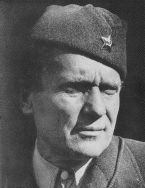
Tito, Josip Broz (1892-1980), president of Yugoslavia, who established a Communist state
independent of the Union of Soviet Socialist Republics (USSR) after World War II (1939-1945),
and later became a leader of the nonaligned nations. Originally named Josip Broz, he was
born in Kumrovec, Croatia (then part of Austria-Hungary). Tito became a Bolshevik at the
time of the Russian Revolution (1917). After World War I (1914-1918) he worked as an illegal
Communist Party organizer in Croatia. Due to this, he was sentenced to jail and spent the
years between 1928 and 1934 in prison. After serving the time, he took the name Tito as
an alias and went Moscow
In 1937 Tito returned to Yugoslavia. After Nazi Germany attacked Yugoslavia in 1941,
Tito formed an all-Yugoslav Partisan force to resist the Germans and their supporters.
The Allies gave their support to Tito in 1944 and by the end of 1945 the Germans were defeated.
Tito now began setting up a one-party dictatorship. At first Tito was a loyal follower of
Joseph Stalin, but when the Soviet leader criticized some of his actions he asserted
Yugoslav independence. Tito revived the concept of workers' self-management and recommended
liberal economic reforms. In the 1960s Tito joined with leaders of African and Asian
countries to promote the concept of nonalignment-independence from both the United States
and the USSR. As one of the most influential manipulators of postwar power politics, Tito
controlled Yugoslavia for 35 years.
